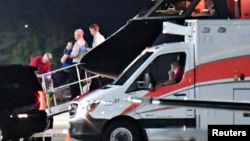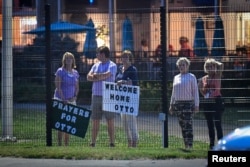Otto Warmbier’s release from a North Korean prison camp in a critical comatose state this week was barely acknowledged by advocates for engagement at a Doing Business in North Korea conference Wednesday in Seoul.
Warmbier is an American university student who was arrested for trying to steal a propaganda poster in January 2016 while on an excursion trip to North Korea. He was sentenced to 15 years of hard labor for “hostile acts against the state.”
Cautionary tale
It is unclear what happened to Warmbier in captivity. North Korean officials reportedly told American envoys that he was given a sleeping pill after contracting botulism 15 months ago, and then fell into a coma from which he has not recovered. The gravely ill 22-year-old University of Virginia student was medically evacuated Tuesday and is being treated at a hospital in Cincinnati near his parents’ home in Ohio. Medical experts say chances are very low that a person in a vegetative state for so long will make a full recovery.
Warmbier’s experience is a tragic and cautionary tale, but one that should guide rather than prohibit international efforts to engage North Korea through economic development and tourism, said Andray Abrahamian, an honorary fellow at Macquarie University in Sydney, who has facilitated business training programs in North Korea.
“There are clearly benefits to it, to engaging as I see it. You have to realize though that it is a difficult place, and a place with a lot of rules that are extremely outside the norms that most of us are used to. And as such, a degree of sensitivity and caution is required when you visit,” Abrahamian said on the sidelines of the conference.
Ongoing atrocities
However, rather than downplaying Warmbier’s debilitating treatment, Phil Robertson, the deputy Asia director at Human Rights Watch, called North Korea a “human rights black hole” in a statement Tuesday, and said the international community should prioritize “security and human rights concerns when dealing with Pyongyang.”
North Korea continues to hold three other American citizens. Robertson said Pyongyang has a “rights abusing history of seizing foreign nationals for political purposes,” to influence public opinion or to extract concessions.
The Kim Jong Un government also stands accused of ongoing atrocities comparable to those committed by Nazi Germany. These charges were made in a U.N. Commission of Inquiry report in 2014 that documented a network of political prisons in the country incarcerating nearly 120,000 men, women and children, as well as widespread and systematic abuses that include torture, enslavement, rape and murder.
The U.N. General Assembly subsequently passed a resolution to refer North Korea to the International Criminal Court for crimes against humanity. But the measure has since been stalled in the Security Council, where the North’s allies, China and Russia, are believed to be preventing any further action on this measure.
Ineffective sanctions
At the North Korea business conference in Seoul, few would discuss Warmbier’s treatment on the record. Journalists were also prohibited from recoding any of the sessions. Some participants said North Korean officials have severed business ties with individuals in the past who were quoted in perceived negative reports.
Conference participants who have organized business missions to North Korea say sanctions have slowed but not stopped economic growth and outside investment continues, mostly from China.
There are real but unacknowledged market reforms in this self-proclaimed socialist state that are driving modernization and technological progress, and the development of new domestic products from kimchi chips to solar powered vehicles. And while there is a wide gap between affluent Pyongyang and modest rural areas, cities like Wonson are also growing with new infrastructure projects and shops currently under construction.
Many participants like Abrahamian believe more outreach rather than increased economic sanctions and diplomatic pressure is needed to persuade North Korea to live up to international norms on human rights, and to eventually give up its nuclear weapons program. However Pyongyang’s continued provocative missile tests and its inhumane treatment of people like Warmbier make engagement difficult to justify.
“It’s tricky right, because engagement is in the long term the only way I think to help and encourage the North Koreans to move in a positive direction, in terms of how they run their own society. But it does butt heads with the nuclear issue and with sanctions. It’s a tricky time,” he said.
Youmi Kim contributed to this report.






